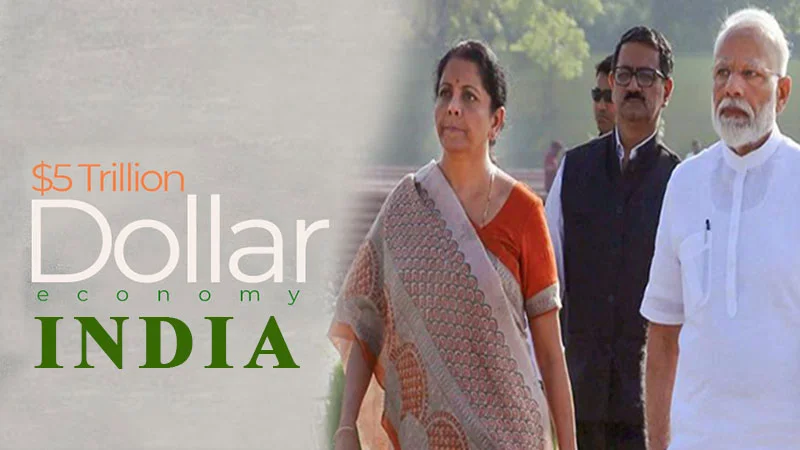5 Trillion Dollar Economy India: Knowledge production and foreign policy go hand in hand. Thus, stronger investment in the university system will ensure multidisciplinary and indigenously driven scholarship.
What would be the attributes of a foreign policy and of diplomacy to sustain a five-trillion dollar economy? The answer will surely lie in looking back as also in gazing beyond the horizon.

As 2019 ends, it is useful to recall that a century ago, India signed the Treaty of Versailles and joined the League of Nations as a full-fledged member, even while it was still a colony. Next year will, in fact, be a double anniversary. In 1920, India attended the first meeting of the League, and, in 1945, it signed the charter of its successor, the newly formed United Nations Organisation. Therefore, 2020 will mark both a century of Indian multilateralism and 75 years of membership of the UN.
Along with this multilateral heritage is an equally rich history of bilateral engagements. Much of our encounter with Africa, South East Asia and even further east followed either an earlier trajectory of civilisational contact, or the trail of Indian indentured labour. A common experience of anti-colonial struggle cemented these earlier bonds in the 1950’s and 1960’s.
Visit our store at http://online.ensemble.net.in
When Independent India was reforging these links in the 1950’s and 1960’s, the narrative of Afro-Asian and Third World solidarity extended both bilaterally and multilaterally. Our recollections of that period, therefore, are of a foreign policy that had a considerable normative and ethical momentum to it.
Anti-colonialism, anti-racism, Non Alignment, South-South Cooperation are the headlines that encapsulate our memories and this was consistent with our own emergence as a sovereign entity.
The building up of a larger infrastructure of knowledge to sustain foreign policy and diplomacy was an integral part of this process. This was a very conscious fostering of scholarship not just of international relations and foreign policy, but also of studying other countries and regions in their own right. This initiative was concretised by embedding within selected universities multidisciplinary Area Studies Centers.
This began from the early 1960s, and over the next half century, over 30 to 40 such centres came up focusing on different regions and countries across disciplines of economics, sociology, history and anthropology in addition to studying bilateral relations with India or Third World countries. In some of these, there were facilities to teach foreign languages. These centres gradually also fed the demand for research staff and faculty in different universities to teach international relations and foreign policy.
What underwrote this was obviously the view that an independent foreign policy needed to have its own knowledge base. Precisely because large parts of the world were emerging from colonial pasts, it was important that our knowledge about them was derived not from the universities and research institutes of former colonial masters, but rather was generated by India.
As we look ahead for diplomacy to sustain a five trillion dollar economy, the core principle of our own scholarship being part of the supportive infrastructure of foreign policy must not just be retained but also strengthened.
A recent initiative of the government is the setting up of a large number of new embassies, especially on the west coast of Africa. This region had received relatively less attention given our traditional focus on east and South Africa. Similarly, the prime minister’s recent visit to Vladivostok for a summit with the Russian president saw the announcement of a number of initiatives that promise specific actions with regard to India and the Far East. Again, this is a vast area outside our traditional focus.
Such steps are only the initial forays that suggest what the broad terrain of a foreign policy for a five trillion dollar economy will be. However, such a policy will only be effective and sustainable if there is a corresponding investment in the future production of knowledge through the fostering of scholarship. This can only be done through the university system and it is a fallacy to think that think tanks or policy-oriented institutes can be a full substitute. Howsoever convenient — and in our digitised world the convenience factor is considerable — accessing foreign or western scholarship can never be a substitute. Other countries — Japan, Korea, Russia and China — in many ways do not face this problem in the same degree. A lack of familiarity with English, therefore, leads them to do original work themselves and what the output may otherwise lack, it is not derivative or dependent on external scholarship.
View our Blog: https://ensembleias.com/blog/
Knowledge production and foreign policy always go hand in hand. The Area Studies Centers of the past are a useful template for the future. No doubt, change and rejuvenation is required.
However, reform has to be achieved on the premise that there can be no substitute for our own knowledge basis for foreign policy.
Written by TCA Raghavan | Source : Hindustan Times





